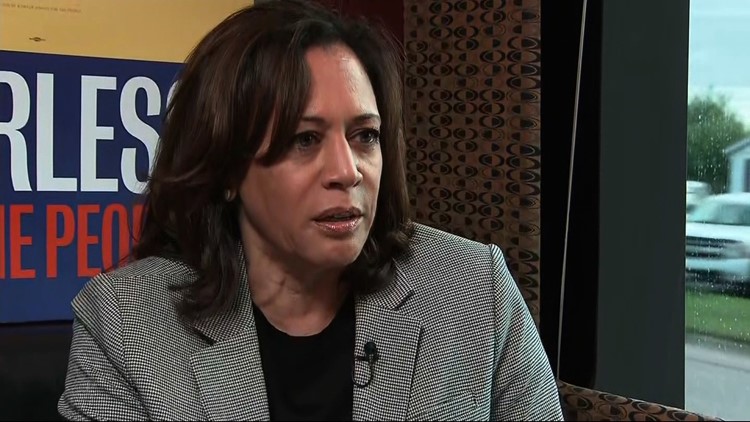(CNN) — In an interview with CNN on Monday, Sen. Kamala Harris argued that President Donald Trump has failed to deliver on his promises to workers. And she issued a dire warning about autoworkers’ jobs in particular.
“He said he was going to help working people, and it is estimated that as many as 300,000 autoworkers may be out of a job before the end of the year,” she said aboard her campaign bus in Iowa.
That was a more conservative figure than Harris used July 12 on the radio show “The Breakfast Club,” during which she said, “He’s helped the top 1% and the biggest corporations. Meanwhile, some estimate that as many as 700,000 autoworkers were going to lose their job before the end of the year.”
Both figures are incorrect.
Facts First: There is no credible estimate that 300,000 autoworkers might lose their jobs by the end of the year. And there has been an increase in autoworker jobs during the Trump presidency, though there has been a slight decrease over the past year.
We can’t fact-check the future of automotive employment; anything is possible, even a sudden depression. But Harris was wrong to claim that experts are suggesting there might be a massive decline in autoworker jobs within five months.
Harris’ campaign told CNN that the “300,000” figure came from a study published in February by the Center for Automotive Research. That study, however, estimated approximately 367,000 job losses in the entire economy, not among autoworkers in particular.
And the estimate was for job losses a year after Trump imposed a 25% tariff on automobiles and auto parts from every country except for Canada, Mexico, and South Korea — which he has not done.
Kristin Dziczek, a co-author of the study and the Center for Automotive Research’s vice president for industry, labor, and economics, said the center has not published a specific job-loss estimate for autoworkers. But she said it is “highly unlikely” there would be a loss even close to 300,000 autoworkers by the year’s end.
The number of people employed in “production and nonsupervisory roles” making automobiles and auto parts — plant workers, in other words — did fall over the last year, from 648,100 in June 2018 to 640,200 in June 2019, according to Bureau of Labor Statistics data. But that’s a decrease of about 1%, nothing approaching the catastrophic collapse Harris suggested might becoming.
“The sector is starting to shrink,” Dziczek said, but a rapid loss of 300,000 autoworker jobs “would be orders of magnitude worse than what we’re expecting to see.”
Dziczek said that 90% of the hypothetical 367,000 job losses in the February study were attributable to the possibility of Trump imposing the 25% tariff.
Trump could certainly still impose such a tariff, but he decided in mid-May to delay a decision for six months. So even if there were 300,000 job losses throughout the economy after a hypothetical tariff did come into effect, the delay means they would be highly unlikely to occur by the end of 2019.
Harris’ “700,000” figure relied on a previous Center for Automotive Research study, published in July 2018, that estimated a loss of more than 700,000 jobs if Trump imposed a 25% tariff on automobile and auto parts imports from every country. This estimate, too, was for all kinds of jobs, not autoworkers alone, and the Center for Automotive Research says it has been supplanted by the updated analysis in the February 2019 study.
Trump has made false claims about his record on auto jobs — inaccurately boasting, among other things, that new auto plants are being built in places like Florida and Pennsylvania. But he is correct when he says auto jobs have been created during his tenure.
In June, there were 195,600 production and nonsupervisory employees involved in the manufacturing of motor vehicles, up 14% from 171,000 in January 2017.
For production and nonsupervisory employees involved in parts manufacturing, it was 444,600 in June, down 2% from 454,500 in January 2017. Still, for vehicles and parts manufacturing as a whole, including supervisory workers and people involved in manufacturing bodies and trailers, there were 1,005,500 people employed as of July, up 5% from 955,800 in January 2017.
Harris could fairly argue that Trump has had a modest impact on industry employment. But she is wrong in suggesting that experts believe he might cause autoworker employment to plunge within months.



